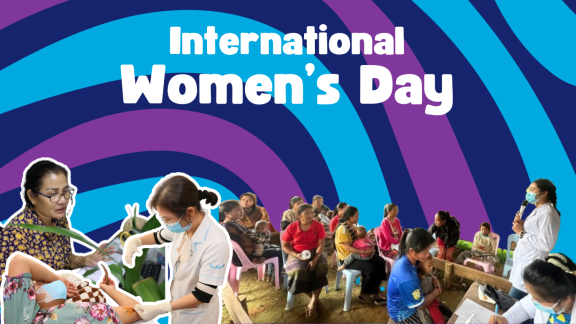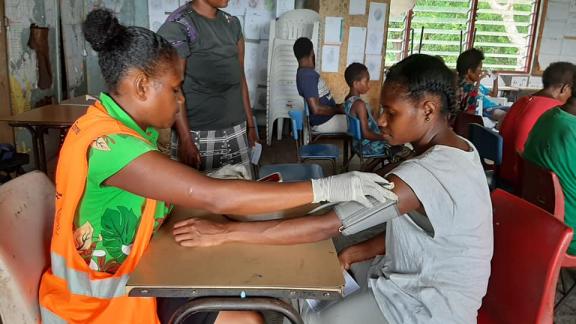As the world faces an increasing number of significant crises, protecting gender equality and reproductive rights has never been more crucial. Recent UN data highlights a key challenge in achieving gender equality by 2030: a lack of financing, with an annual deficit of USD 360 billion required for gender equality measures.
The Responding with Essential Sexual and Reproductive Health and Rights (SRHR) Provision and New Delivery Mechanisms (RESPOND) project, a key initiative of the Australian Government Department of Foreign Affairs and Trade’s (DFAT) Indo-Pacific Sexual and Reproductive Health Rights COVID-19 Surge Response (C-SURGE) program, aims to bolster SRHR for populations impacted by COVID-19.

Implemented jointly by the International Planned Parenthood Federation (IPPF) and Marie Stopes International (MSI), this two-year project, launched in 2021, has spanned 21 countries in the Asia Pacific region, 18 of which IPPF has a presence: Cambodia, Laos, Indonesia, Philippines, Bhutan, Sri Lanka, Pakistan, Nepal, Maldives, Papua New Guinea, and the Pacific Islands (Cook Islands, Fiji, Kiribati, Samoa, Solomon Islands, Vanuatu, Tonga, and Tuvalu).
Throughout the program, 22,253,252 essential Sexual and Reproductive Health (SRH) services were provided, serving 5,494,430 clients. This significant effort has led to the prevention of 1,255,100 unintended pregnancies and 468,059 unsafe abortions, contributing to the broader goal of enhancing reproductive health and rights. Some highlights of the transformative impact of RESPOND:
Strengthening Public Sector Partnerships for Enhanced Health Services
The RESPOND project has been a critical opportunity to establish or consolidate partnerships with governments, assist in national COVID-19 responses and long-term recovery, and routine SRH service provision following COVID-19. This has involved integrating SRH services with awareness-raising and community outreach in collaboration with the government and developing referral systems between Ministry of Health (MOH) staff and IPPF’s MAs for SRH services. Government partnerships are essential in continuing SHR services, messaging to diverse communities, and SRH advocacy to governments.
“Through the RESPOND funding, RFHAF has reached marginalised groups beyond the scope of government services due to limited resources. It has allowed us to provide SRH services in the Islands and to people in the highlands. This has made the Ministry of Health and Medical Services more confident that RFHAF is complementing and supplementing their SRHR roles.” -Reproductive Health Association of Fiji (RFHAF).
MSI’s program in Nepal has handed over 26 health facilities across nine municipalities to the public health system. Each health facility now offers a wide range of family planning options. As part of the public sector support, MSI trained 40 government healthcare providers in long-acting contraception, cervical cancer screening, STI checks and other essential family planning services. This means that people in these areas can now receive safe, high-quality services from trained providers via the public health system.
Expanding Access to Marginalised Communities and Young People
The RESPOND project has marked a significant milestone in expanding access to marginalised and underserved populations, showcasing it as a crucial achievement and paving the way for future outreach to key communities. This initiative has notably shifted from traditional static clinics to innovative mobile and outreach services that reach geographically remote and isolated communities. This strategic approach also targets groups facing compounded barriers to accessing services, including women and girls, young people, the LGBTQIA+ community, and refugees.
In Cambodia, MSI has introduced a comprehensive contact centre, a pivotal resource for women—especially teenage girls—to make informed decisions about their sexual and reproductive health. Qualified counsellors guide a range of issues, from sexually transmitted infections (STIs) and safe abortion to contraception options and menstrual health. The anonymity of the hotline plays a crucial role in dismantling the stigma and shame often associated with family planning and sexual health discussions. Last year, MSI counsellors in Cambodia heard from over 2 million clients via digital platforms, including social media, WhatsApp emails and the hotline.
Moreover, the project emphasises fostering disability inclusion, recognising that making accommodations and removing barriers not only benefits individuals with disabilities but enriches society as a whole. IPPF and MSI are committed to continuously improving policies, attitudes, and accessibility towards inclusive approaches.
A notable example includes the training on disability inclusion in the Philippines, where the Family Planning Organization of the Philippines (FPOP) has been enhancing its partnership with a national disability organisation. This strategic collaboration aims to mainstream disability inclusion in Sexual and Reproductive Health (SRH) services, demonstrating a comprehensive approach to reaching and supporting marginalised communities.

Supporting Survivors of Sexual and Gender-Based Violence (SGBV)
In the second year of the RESPOND program, efforts to enhance services and support for Sexual and Gender-Based Violence (SGBV) survivors have seen significant advancement. The goal is to strengthen essential support needed by communities and tailor the delivery of services in contextually relevant ways and sensitive to the survivors' needs.
In Cambodia, the Reproductive Health Association of Cambodia improved the overall condition of the healthcare facilities and trained government healthcare staff in the two RESPOND operational districts of Battambang and Kampot, who are now able to provide quality SGBV response services to clients who need them. To date, 55 clinics have been renovated to provide confidential, dedicated counselling rooms for clients, and 170 providers have been trained, resulting in 720 services provided. Now, 72 health facilities have SGBV screening and reporting integrated into their standard operations. In Laos, the Promotion of Family Health Association of Lao PDR supports the SGBV Network in 4 districts for referral to legal aid and health services, chaired by the Lao Women’s Union.
MSI’s family planning providers are often on the frontline of supporting victims of sexual and gender-based violence. A key focus of the RESPOND program is to support the MSI team in identifying and counselling survivors and referring them to specialist agencies. In Vietnam, the MSI team collaborates with civil society organisations to provide gender-sensitive reproductive healthcare services to survivors. In Year 2, MSI Country Programs (CPs) have seen a high increase in SGBV referrals, with 2,920 referrals reported.

From supporting Sexual and Gender-Based Violence (SGBV) survivors to expanding access to marginalised communities and implementing innovative service delivery methods, the collaborative efforts of the International Planned Parenthood Federation (IPPF) and Marie Stopes International (MSI) have set a new standard for impactful health initiatives. This International Women’s Day, let's continue transforming challenges into opportunities for advancing gender equality and improving reproductive health for all.
For more information, contact:
Malarvili Meganathan,
Regional Communications, Voice & Media Advisor,
East, Southeast Asia and Oceania Region
[email protected]
when









